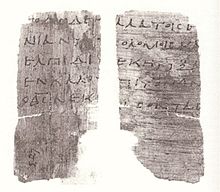
| Part of a series on |
| Books of the New Testament |
|---|
 |
The Acts of the Apostles[a] (Koinē Greek: Πράξεις Ἀποστόλων, Práxeis Apostólōn;[2] Latin: Actūs Apostolōrum) is the fifth book of the New Testament; it tells of the founding of the Christian Church and the spread of its message to the Roman Empire.[3]
Acts and the Gospel of Luke make up a two-part work, Luke–Acts, by the same anonymous author.[4] Traditionally, the author is believed to be Luke the Evangelist, a doctor who travelled with Paul the Apostle. It is usually dated to around 80–90 AD, although some scholars suggest 110–120 AD.[5] The first part, the Gospel of Luke, tells how God fulfilled his plan for the world's salvation through the life, death, and resurrection of Jesus of Nazareth. Acts continues the story of Christianity in the 1st century, beginning with the ascension of Jesus to Heaven. The early chapters, set in Jerusalem, describe the Day of Pentecost (the coming of the Holy Spirit), the expulsion of Christians from Jerusalem and the establishment of the church at Antioch. The later chapters narrate the continuation of the message under Paul the Apostle and concludes with his imprisonment in Rome, where he awaits trial.
Luke–Acts is an attempt to answer a theological problem, namely how the Messiah of the Jews came to have an overwhelmingly non-Jewish church; the answer it provides is that the message of Christ was sent to the Gentiles because the Jews rejected it.[3] Luke–Acts can also be seen as a defense of the Jesus movement addressed to the Jews: the bulk of the speeches and sermons in Acts are addressed to Jewish audiences, with the Romans serving as external arbiters on disputes concerning Jewish customs and law.[6] On the one hand, Luke portrays the followers of Jesus as a sect of the Jews, and therefore entitled to legal protection as a recognised religion; on the other, Luke seems unclear as to the future that God intends for Jews and Christians, celebrating the Jewishness of Jesus and his immediate followers, while also stressing how the Jews had rejected the Messiah.[7]
- ^ "Bible Book Abbreviations". Logos Bible Software. Archived from the original on April 21, 2022. Retrieved April 21, 2022.
- ^ Matthews 2011, p. 12.
- ^ a b Burkett 2002, p. 263.
- ^ Burkett 2002, p. 195.
- ^ Tyson, Joseph B., (April 2011). "When and Why Was the Acts of the Apostles Written?", in: The Bible and Interpretation: "...A growing number of scholars prefer a late date for the composition of Acts, i.e., c. 110-120 CE. Three factors support such a date. First, Acts seems to be unknown before the last half of the second century. Second, compelling arguments can be made that the author of Acts was acquainted with some materials written by Josephus, who completed his Antiquities of the Jews in 93-94 CE...Third, recent studies have revised the judgment that the author of Acts was unaware of the Pauline letters."
- ^ Pickett 2011, pp. 6–7.
- ^ Boring 2012, p. 563.
Cite error: There are <ref group=lower-alpha> tags or {{efn}} templates on this page, but the references will not show without a {{reflist|group=lower-alpha}} template or {{notelist}} template (see the help page).